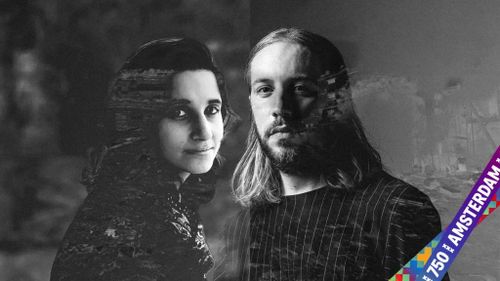Writing on Genocide: Rita Baroud x Maurits de Bruijn

Two authors write about the destruction of Gaza, each from their own perspective. She, as a Gazan journalist in exile; he, as a Jewish Dutchman. At De Balie, Rita Baroud and Maurits de Bruijn engage in conversation. How do you write about indescribable genocidal violence?
There was a time when Maurits de Bruijn (1984) imagined himself living in Israel, a vibrant, multicultural country where he could reconnect with his Jewish roots, severed by the Holocaust. But that affection cooled when De Bruijn was confronted with the other side of the country: the oppression of the Palestinians. He began to speak out against the violence committed in the name of Jewish security. For his latest book, Geweten (Conscience), he returned to Israel and Palestine to see for himself how things stand, to talk to people directly, and to possibly revise his judgment.
Journalist – and until October 2023, a student of French – Rita Baroud (2002) lived through the devastating war in Gaza. For international media outlets, including NRC, she wrote about the displacement and hunger she experienced, about the constant presence of death. This past april, she fled to Marseille. But her heart and mind remain in Gaza. “I write, I speak, I document, I tell stories... because that is the only thing I can still do for them here. I can’t send them bread, but I can send words. I can’t stop the rockets, but I can scream with their voice. Every time the thought creeps in that I’ve abandoned them, I tell myself: the real betrayal begins only when we fall silent.”
At De Balie, we’ll talk about the role of the writer in the face of collective violence. How do you give language to what feels unspeakable? And when the world demands clarity, allegiance, or silence – how do you insist on complexity?
About VrijdenkersfestivalDuring the sixth edition of Vrijdenkersfestival, we will honor, question, and continue the Amsterdam tradition of liberal-mindedness. With online echo chambers growing louder and public debate is increasingly about choosing sides, we offer the stage to contemporary free thinkers who prefer doubt over certainty. Who would rather ask good questions than give the right answers. Who dare to assume they might be wrong. And in doing so, chart their own course – free from dogma, labels, and authority. Or, as Annie M.G. Schmidt perhaps captured the spirit of free thinking best: ‘Never do as your mother said, and all will turn out fine instead.’
NederlandsTwee auteurs schrijven elk vanuit hun eigen perspectief over de vernietiging van Gaza. Zij als Gazaanse journalist op de vlucht, hij als Joodse Nederlander. In De Balie gaan Rita Baroud en Maurits de Bruijn met elkaar in gesprek. Hoe schrijf je over onbeschrijfelijk genocidaal geweld?
Er was een tijd dat Maurits de Bruijn zichzelf ooit in Israël zag wonen, een levendig, multicultureel land waar hij in contact kwam met zijn Joodse wortels, die waren afgesneden door de Holocaust. Maar de liefde bekoelt wanneer De Bruijn in aanraking komt met de keerzijde van het land: de onderdrukking van de Palestijnen. De Bruijn ging zich uitspreken tegen het geweld dat in naam van Joodse veiligheid wordt gepleegd. Voor zijn nieuwste boek ‘Geweten’ bezocht hij opnieuw Israël en Palestina om zelf te zien hoe het daar nu gaat, zelf met mensen te kunnen spreken zijn oordeel eventueel bij te kunnen stellen.
Journalist en voor oktober 2023 nog student Frans Rita Baroud doorleefde de vernietigende oorlog in Gaza. Voor internationale media, waaronder NRC, schreef zij over de ontheemding en honger die zij meemaakte. Over de voortdurende aanwezigheid van de dood. Afgelopen april vluchtte ze naar Marseille. Maar hart en geest zijn in Gaza gebleven. ‘Ik schrijf, ik spreek, ik leg vast, ik vertel verhalen... want dat is het enige wat ik hier nog voor hen kan doen. Ik kan hen geen brood sturen, maar wel woorden. Ik kan de raketten niet stoppen, maar ik kan schreeuwen met hún stem. Elke keer als de gedachte me bekruipt dat ik hen in de steek heb gelaten, zeg ik tegen mezelf: het echte verraad begint pas wanneer wij zwijgen.’
In De Balie gaan we in gesprek over de rol van de schrijver in het aangezicht van collectief geweld. Hoe beschrijf je het onbeschrijvelijke? En wanneer de wereld om duidelijkheid, loyaliteit of stilte vraagt, hoe blijf je dan vasthouden aan complexiteit
Dit programma vindt plaats in het Engels